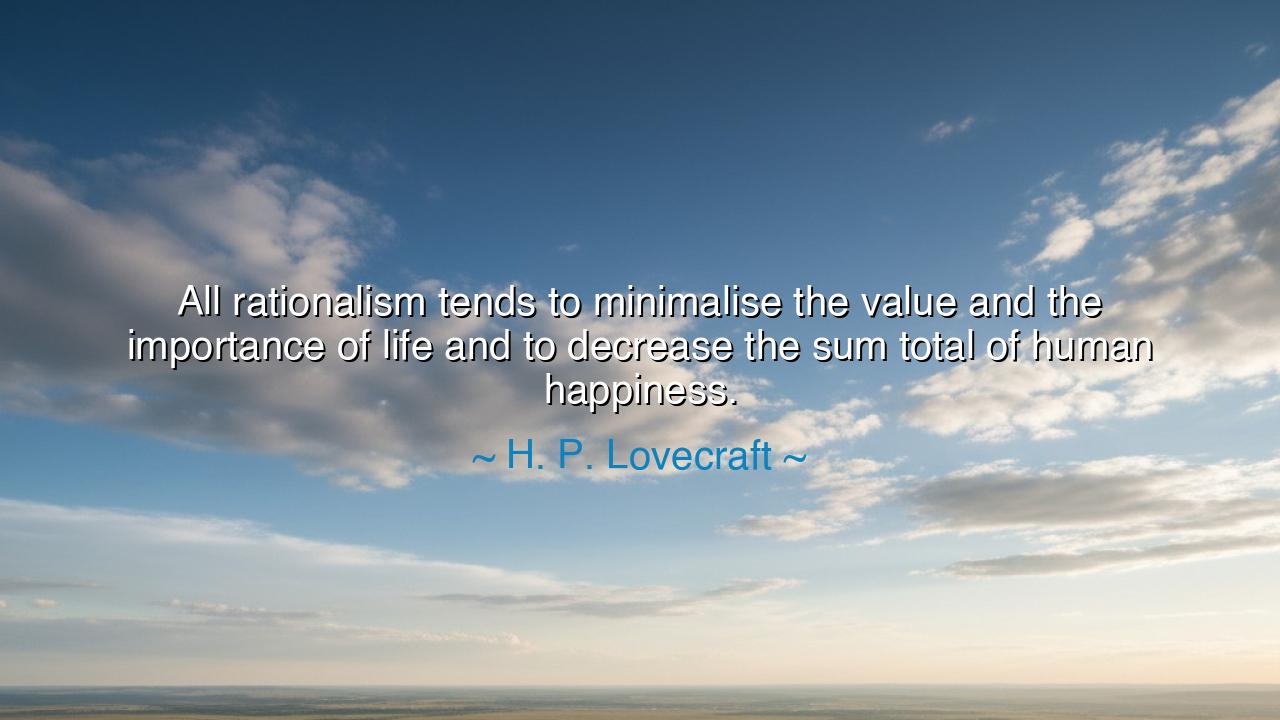
All rationalism tends to minimalise the value and the importance
All rationalism tends to minimalise the value and the importance of life and to decrease the sum total of human happiness.






“All rationalism tends to minimalize the value and the importance of life and to decrease the sum total of human happiness.” Thus spoke H. P. Lovecraft, the dark dreamer of Providence, whose imagination pierced both the cosmic void and the depths of the human soul. Though known as a writer of horror, this reflection reveals not fear but lament—a cry from a mind that saw the shadow side of reason. In these words, Lovecraft warns that when rationalism becomes the only lens through which we see the world, it strips life of its mystery, its wonder, and its sacred meaning. What begins as enlightenment may end as emptiness, for the heart withers when the soul is reduced to a calculation.
The origin of this quote lies in Lovecraft’s personal philosophy and the age in which he lived—the early twentieth century, an era that worshiped science and reason as new gods. The old myths were fading, and humanity, enthralled by its own intellect, began to measure all things by logic and proof. Lovecraft admired science deeply; he revered truth and detested superstition. Yet he also saw the spiritual cost of such devotion. For in the relentless pursuit to explain everything, the modern mind had lost its capacity for awe. When life becomes a series of mechanisms, where is the room for meaning? When love is reduced to biology, morality to chemistry, and the soul to neurons, what remains of the sacred essence that once bound humanity together?
In this sense, Lovecraft’s words echo an ancient wisdom. The philosophers of old understood that reason alone is not enough to sustain the human spirit. Plato spoke of the soul’s longing for the divine; Pascal wrote that the heart has reasons which reason knows not. Even the Stoics, lovers of logic, believed that wisdom required harmony between mind and virtue, not intellect alone. Lovecraft’s warning, then, is not a rejection of knowledge—it is a plea for balance. For when rationalism seeks to conquer the mysteries of existence, it diminishes the very poetry of being alive. It forgets that to live is not merely to understand, but to feel, to wonder, and to believe in something beyond proof.
Consider the story of Fyodor Dostoevsky, another soul who wrestled with reason and meaning. As a young man, he was sentenced to death for his political ideas; moments before his execution, his life was spared. In that instant, facing mortality, he saw with piercing clarity the preciousness of existence—the light of the sun, the color of the sky, the beating of his heart. Later, in his writings, he warned that a purely rational society, one without faith or spirit, would lead only to despair. His characters—cold intellectuals, proud idealists—inevitably crumble before the raw force of love, suffering, and grace. Like Lovecraft, Dostoevsky saw that happiness cannot be engineered; it must be experienced through the mystery of being human.
Rationalism, when pure and untempered, seeks to make life smaller. It breaks the world into pieces and studies each fragment, but forgets that life is not a sum of parts—it is a living whole. The scientist may know the chemical composition of a rose, but still fail to know its beauty. The philosopher may define love, but never feel its fire. The skeptic may dismantle the heavens, but in doing so, loses the stars. Thus, Lovecraft’s statement is not an argument against knowledge—it is a sorrowful recognition that in conquering mystery, we risk extinguishing wonder, and in extinguishing wonder, we diminish happiness itself.
The lesson, then, is this: seek truth, but do not banish mystery. Embrace reason, but do not exile reverence. Let the mind illuminate, but let the soul still dream. For the human being is not a machine to be explained, but a flame to be tended. When we honor only logic, we starve the heart; when we honor mystery alongside it, we become whole. Happiness is not found in what we can measure, but in what we can marvel at—the laughter of a child, the beauty of a sunrise, the quiet presence of love. These things cannot be dissected, only lived.
So remember, dear listener: do not allow rationalism to steal from you the sacred wonder of existence. Study the stars, but still gaze at them in awe. Understand the world, but also revere it. For the greatest wisdom lies not in knowing how the universe works, but in feeling humbled that it exists at all. When knowledge walks hand in hand with reverence, when reason serves wonder rather than replaces it, then the soul is at peace, and the sum total of human happiness grows—not diminished, but exalted.






AAdministratorAdministrator
Welcome, honored guests. Please leave a comment, we will respond soon